Sunderland veteran who hit 'rock bottom' urges others to seek help with their mental health


“It is just something you are conditioned to do from your time in the Army,” says Chris 46.
“It is part of your military training so that you can keep an eye on what is going on and it never goes away.”


Advertisement
Hide AdAdvertisement
Hide AdNext year will mark 20 years since the former lance corporal with the 1st Battalion of the Light Infantry quit the forces.
Yet, very much like the training, the memories of what he witnessed during two tours of the then troubled province have never disappeared.
Memories which he has only finally started to discuss at the end of last year after hitting in his own words “rock bottom”.
“As a soldier you are told to crack on, have a couple of pints and get on with it,” he reminisces over a soft drink.


Advertisement
Hide AdAdvertisement
Hide Ad“You bottle things up and use alcohol as a coping strategy when you are feeling low. That was the culture in the Army at the time.”
Like many veterans back in civilian life, Chris was able to secure regular work with security companies guarding merchant vessels from pirates in the dangerous Indian Ocean.
While this provided him with a well-paid living in an alcohol-free environment, drink began to dominate his spare time when he returned home and a short spell in jail followed for violence.
Chris, from the Seaburn area of Sunderland, continues: “I would say I was a binge drinker, not an alcoholic, but at my worst I could drink 10-15 bottles of wine a day. It was chaotic”


Advertisement
Hide AdAdvertisement
Hide AdWith the downward spiral ruining relationships - he omits further details out of respect for those concerned - and the overseas work gradually disappearing, it was a former Army colleague who convinced him to seek professional help last Christmas.
Chris, a former pupil at the city’s Monkwearmouth School, adds: “He knew something was not quite right and that I needed help.
“The mental health crisis team in Sunderland gave me medication and monitored me with day-to-day community care.”
“Since then I have not looked back and I think one of the biggest barriers for a soldier to overcome is to admit they need help.”
Advertisement
Hide AdAdvertisement
Hide AdDiagnosed with chronic Post Traumatic Stress Disorder (PTSD), depression and anxiety, he was referred to mental health veterans charity Combat Stress, which was set up after the First World War to tackle shell shock, and began seeing a community psychiatrist.
He continues: “They taught me not to worry about the past, worry about your health and learning how to speak your feelings.
“You would learn how to control your breathing and to go for walks instead of using alcohol to control your mental health.”
His progress has continued during a six-week stay at its Hollybush House Treatment Centre, in Ayrshire.
Advertisement
Hide AdAdvertisement
Hide AdChris adds: “It was very intensive. You record your one-to-one discussions about your life and listen to them over and over again so that you can come to terms with your problems and learn how to lock them away.”
Having not touched alcohol since Boxing Day, he is also receiving help locally from the newly-formed Veterans in Crisis Sunderland community interest group.
Founder Ger Fowler, 48, another Northern Ireland veteran from the same area of Sunderland, accompanies him on regular morning walks to introduce a new routine to his life.
“It has helped just talking to someone who knows what you have gone through because they were there as well,” said Chris.
Advertisement
Hide AdAdvertisement
Hide Ad“The difference in him since Christmas is almost like a miracle,” he says.
“He has had to undergo torture discussing his life, the Army, the gun boats. I spoke to him every day on the phone when he was up there and he is making rapid strides.
“Even things like helping him get hearing aids have helped. He spent years without them after going deaf from the Army and we were able to get them in a fortnight once we realised there was a problem.
Advertisement
Hide AdAdvertisement
Hide Ad“Now he can understand what people are saying to him to far easier and that is helping him improve too.”
Settled in a new relationship, Chris’s hope is that he earn mental health qualifications and begin passing on what he has learned to other ex-servicemen and women.
He fears he will be needed.
“We have a generation of lads who have seen some horrendous things. First of all there was Northern Ireland and then Iraq and Afghanistan,” says Chris.
“It took me 18 years to say something so there will be an epidemic of people after me who need help.”
Advertisement
Hide AdAdvertisement
Hide Ad*VICS holds weekly surgeries on Tuesdays at the Gunners Club, 10-11 Mary Street, Sunderland, from 10am-1pm.
Further information is also available from (07398) 916590 or at its Veterans in Crisis Sunderland Facebook page.